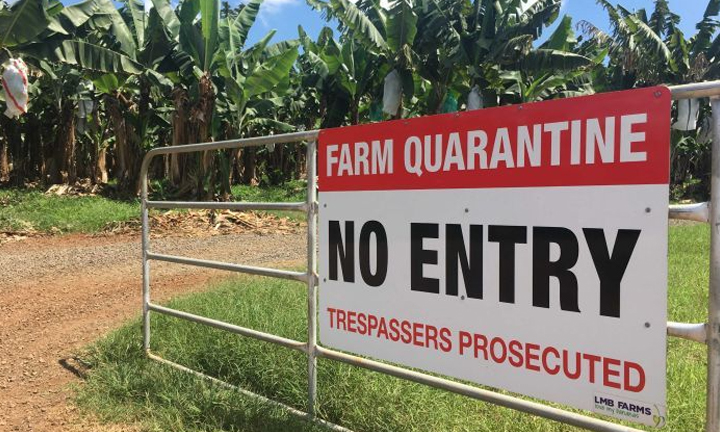Original Source: Lily Nothling, Marian Faa and Charlie McKillop, ABC.net
A devastating fungal disease with the potential to wipe out banana crops has been detected on a farm in Far North Queensland — the heart of Australia’s growing district.
Biosecurity Queensland officers discovered sick plants with symptoms of Panama disease tropical race 4 (TR4) during routine surveillance at a Tully Valley property in January.
The organisation’s Panama TR4 program leader, Rhiannon Evans, said the farm had been locked down and further tests were underway.
“We have taken early regulatory action to protect the broader industry while we have this very high, or reasonable confidence at least, that Panama is present on the property,” Ms Evans said.
Australian Banana Growers’ Council chairman Stephen Lowe said the news was alarming.
“All new detections of Panama race 4 in the banana industry are extremely concerning,” Mr Lowe said.
If confirmed, the banana farm would be the fourth in Far North Queensland to be contaminated, and the first case of the soil-borne disease in two years.
The fungus does not affect the fruit but causes the plants to wither and die.
Mr Lowe said the affected farm was scrambling to quarantine its operations.
“The family involved is going at a hundred miles an hour, trying to get the property to a stage where they will be able to trade,” Mr Lowe said.
“It’s not a nice place to be when you find out you have such a terrible disease on your farm.”
Contaminated farms are still allowed to sell their fruit but must ensure no plant material or soil leaves the property.
Ms Evans said the Tully Valley was considered the epicentre of Panama TR4 in Australia.
“It’s not unexpected that this disease has an ability to move in the wettest part of Australia where it can be carried by contaminated soil and plant material and certainly through overland water flow,” she said.
Ms Evans said it could take up to six weeks for Biosecurity Queensland to confirm the latest case.
“I imagine this is going to be disappointing — it could also be motivating for growers who have perhaps been thinking about their on-farm biosecurity practices,” she said.

